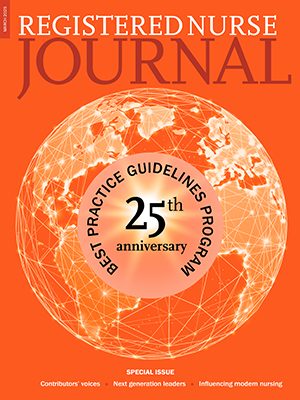Niagara Health supporting internationally educated nurses (IEN)
Niagara Health is participating in a College of Nurses of Ontario (CNO) program that gives IENs the chance to work via supervised partnerships. The Supervised Practice Experience Partnership (SPEP), which began in 2022, is now in place at several Ontario hospitals including Niagara Health. The program requires participants to complete a minimum of 140 hours of supervised practice and demonstrate they can meet a series of standards during their time under supervision. The SPEP program allows IENs who have successfully completed the program to then register through the CNO. Niagara Health then hires these IENs. “It was a really exciting opportunity where we could partner with people who've had such diverse and wonderful experiences internationally and help them learn a little bit more about our Canadian health-care system,” said RNAO member Janice Feather, director of professional practice and education at Niagara Health and the program administrator. (Niagara Falls Review, Feb. 9)
Ottawa and Ontario finalize bilateral health agreement
On Feb. 23, a bilateral agreement between the federal government and Ontario was announced, which includes $73.97 billion in federal funding over 10 years. This amount includes $8.4 billion in new funding for shared priorities and a one-time top-up of $776 million to address urgent health needs. In early February, Prime Minister Justin Trudeau had met with the provincial and territorial premiers to discuss an increase in health funding and had also announced that the federal government would sign bilateral agreements with each province and territory to focus on their individual health needs. The federal government announced its funding offer of $46.2 billion in new money, including a five per cent increase to the Canada Health Transfer for the next five years, which the provinces and territories accepted on Feb. 13. RNAO President Dr. Claudette Holloway said that the Ontario health-care system has a lot of needs and that this money should be used to address priorities such as primary care, mental health, RN retention and recruitment and long-term care. “It’s a good start but we want to know that money is consistently going to be there. As needs go up, funding needs to go up along with that.” (CBC News, Feb. 9)
NP-led clinic in Peterborough still waiting for provincial approval
A proposed clinic in Peterborough is currently waiting for provincial approval. RNAO member Shayna McLauchlan, who took part in the application process for the Ashburn Family Health clinic in Peterborough, says the clinic is committed to their patients and also to the community as a whole. “We just need a green light on this funding so we can go ahead and start providing community members with the care that they deserve.” Once funding is secured, the clinic can begin to hire staff and could begin accepting new patients in as soon as four months.*
*The application for an NP-led clinic in Peterborough is one of two that RNAO is actively advocating for, and being considered by the Ministry of Health. The other is in Orillia – see below. (Peterborough Examiner, Feb. 3)
Orillia NP-led clinic also receives no word of approval from minister of health
A proposed primary care clinic in Orillia that RNAO has been advocating for continues to wait for the province to approve the funding needed to open its doors. Local nurse practitioners had hoped some of the Ontario government monies set aside for primary-care teams, would go toward opening a nurse practitioner-led clinic to provide services to the thousands in the city without a primary-care provider. However, there has been no word from minister Sylvia Jones on when – or whether – the clinic will be funded. RNAO member Janet Greaves, who took part in the application for the clinic last year, says that she and her team are ready to support their fellow Orillians. “We’re here now, we’re ready… Primary care is the foundation to a healthy community.” Once funding is secured, the clinic can begin to hire staff and could begin accepting patients within months. (Simcoe.com, March 16)
Southlake Regional Health Centre designated as a Best Practice Spotlight Organization® (BPSO®)
Congratulations to Southlake Regional Health Centre. Their designation as a BPSO has once again been renewed by RNAO. The organization began pursuing the designation in 2015 and was first designated in 2018. The organization was re-designated in 2020 and late 2022. The BPSO program works with health-care organizations to implement evidence-based practice guidelines (BPG) to improve patient outcomes. Southlake has implemented 13 of RNAO’s BPGs on a variety of topics including: person and family-centred care; caring for older adults with delirium, dementia and depression; ostomy care; and breastfeeding. “Our BPSO designation is a testament to the leadership and dedication of Southlake’s team, as well as our commitment to patient quality and safety,” said Elizabeth Ferguson, vice-president of clinical transformation and patient experience and chief nursing executive at Southlake. (NewmarketToday, Feb. 2)
New federal non-mandatory long-term care (LTC) standards introduced
On Jan. 31, the federal government released national LTC standards – a move RNAO had long advocated for. RNAO is “disappointed the federal government failed to make these standards mandatory, leaving in place patchwork approaches across and within provinces and territories.” The standards also don’t specifically outline the necessary staffing and skill-mix levels needed in LTC homes – a key part of ensuring quality care for all residents. RNAO has previously highlighted the importance of ensuring LTC residents receive adequate care through the Nursing Home Basic Care Guarantee, which highlights the need for four worked hours of direct nursing and personal care per day per resident. (Toronto Star, Jan. 31)
Nursing students, along with other health-care students, urge Ontario government to drop Bill 124 appeal
RNAO member and member of the Nursing Students of Ontario (NSO) Tanya Smith co-authored an op-ed about Bill 124, the wage suppression legislation that the Ontario Superior Court found infringed upon Charter rights. Despite this ruling, the Ontario government is appealing the decision. Smith notes that “nurses are the backbone of our health-care system and the lack of funding for our nurses means not only a lack of staff to support patients, but also a lack of education and mentorship for the next generation of health-care professionals.” It also highlights the important role of experienced nurses in providing guidance not only to newly-graduated nurses but also to physicians. The signatories call on the Ontario government to end its efforts to revive Bill 124. “Anything less signals a blatant disrespect to a profession that deserves more,” writes Smith. (Healthy Debate, Jan. 23)
Nursing in the News
RNAO applauds court decision to strike down Bill 124 but still awaits repeal
The Superior Court of Justice has declared Bill 124 to be “void and of no effect,” as it violates Canada’s Charter of Rights and Freedoms. RNAO’s President Dr. Claudette Holloway thanks the court for its decision, saying it is a great day for nurses across the province who have been demanding that the Ford government repeal Bill 124. She also congratulates the applicants in the case, including the Ontario Nurses’ Association (ONA). “This legislation has been a thorn in the side of the nursing profession since 2019 when it was brought in. It capped annual salary increases at one per cent and led to an exodus of nurses from the profession. Bill 124 conveyed to nurses that their expertise was not valued nor respected.” (See also Globe and Mail, Dec. 1, for further information.)
Chief medical officer recommends masks but issues no mandate
On Nov. 14, the province’s chief medical officer of health, Dr. Kieran Moore, recommended people wear masks in indoor settings given what he described as a triple threat of influenza virus, COVID-19 and respiratory syncytial virus (RSV). The Toronto Star noted the announcement dismayed RNAO, which had been calling for a mask mandate to deal with increasing infection numbers and growing pressure on nurses and hospital emergency rooms and ICUs. RNAO’s President Dr. Claudette Holloway added in a separate media release: “Until the government engages the necessary actions, RNAO urges every Ontarian to wear a mask in indoor public settings and get vaccinated against both COVID-19 and influenza.” In a new development: RSV is now spreading, as well, which is highly contagious. Children’s immune systems are affected much more severely by symptoms that would resemble a common cold in an adult. Therefore, emergency rooms are seeing a spike in respiratory viruses in young children. Some of the more critically ill children are also on ventilators, which forces hospitals to re-allocate those ventilators, which can cause delays in procedures and postpone surgeries. Although data have shown that a mask mandate is needed – positivity rate for the flu is up almost 50 per cent – the provincial government has been slow to respond. (Toronto Star, Nov. 14.)
Funding announced to retain and recruit more NPs in Ontario
In October, the Ontario government re-affirmed funding for long-term care (LTC) in an announcement from the Minister of Long-Term Care, Paul Calandra. RNAO CEO Dr. Doris Grinspun participated on the announcement and said that having more NPs in LTC will benefit the residents greatly. “They were the ones that were there 24/7 in the homes that were lucky to have them.” Previously, in August, the government announced $57.6 million in funding over three years to help LTC homes. This funding will add up to 225 NPs to the system. (Toronto Sun, Oct. 5)
Nurses call on mayoral candidates to support decriminalizing simple drug possession
Preliminary 2021 data from Public Health Ontario showed that 2,880 people died in Ontario from an opioid-related overdose – an 85 per cent increase over pre-pandemic levels. “Nurses have been sounding the alarm on this preventable health crisis and offering evidence-based substance use policy since before the pandemic, yet we have continued to see the number of deaths, hospitalizations and emergency visits soar due to limited or no direct services and supports and an increasingly toxic drug supply,” says RNAO President Dr. Claudette Holloway. “Through this campaign, we are urging mayoral candidates to confront the impacts of the overdose crisis in their cities and to take action upon election.” On Oct. 3, RNAO and its members sent letters to mayoral candidates from across the province, running for municipal office asking them to sign a pledge in support of decriminalizing simple drug possession. (Blackburn News, Oct. 5)
Ministry of Health directs provincial college of nurses to expedite internationally educated nurse applications
In a move applauded and long championed by RNAO, Minister of Health Sylvia Jones directed the College of Nurses of Ontario (CNO) to expedite the applications of internationally educated nurses (IEN) to address the current nursing shortage as of Sept. 7. The CNO will allow IENs living in Ontario to join the workforce once they fulfill the requirements. The CNO said that this could benefit nearly 6,000 applicants and get them out into the workforce. RNAO President Dr. Claudette Holloway says that although the move will help alleviate the province’s nursing crisis, she pinpoints that much more needs to be done: “This is tied up in repealing Bill 124. In addition to expediting the registration of IENs we also need to entice and encourage back... those who have left.” (CityNews Ottawa, Sept. 7)
Federal government finally announces Canada’s new chief nursing officer
For the first time since 2011, Canada has a national chief nursing officer (CNO). RN Leigh Chapman was appointed on Aug. 23 in a special ceremony in Ottawa. Chapman has worked in nursing for almost 20 years and has a background in critical care and community care. Most recently, Chapman was the director of clinical services with Inner City Health in Toronto. Her work there included overseeing the nursing program, caring for people experiencing homelessness and who were affected by COVID-19. RNAO was pleased with the appointment and had been advocating vocally for the CNO role to be reinstated. CEO Dr. Doris Grinspun says the appointment will “start to rebuild the confidence of the nursing profession that Canada is serious about respect for nurses.” (CityNews, Aug. 23)
Brain drain: New nurses impacted by loss of experienced nurses
In an opinion piece, RN Enxhi Kondi shared her perspective on experienced nurses leaving the profession and how their practice-related knowledge will disappear along with them. “The preservation of experienced nurses should be of utmost priority in handling our current health-care crisis in Ontario, yet this is largely inconsistent with the government’s approach,” Kondi writes. She notes that while the government has begun initiatives to encourage people to pursue a career in nursing, the loss of experienced nurses and the mentorship they provide will still be acutely felt. “Even if the government is successful at expanding the nursing workforce with new nurses, it cannot compensate for the loss of knowledge, support and training that expert nurses traditionally impart to novices.” (Toronto Star, Aug. 22)
NP-led clinic in Orillia to help address health-care crisis
A shortage of family physicians has left many people without access to a primary care provider, so Orillia NPs Cathy Suppa and Janet Greaves submitted a proposal to the Ministry of Health for a new NP-led clinic. Three NPs have signed on to work at the clinic, so far. The clinic will be able to serve 3,200 patients who don’t currently have a health provider. The clinic will also serve populations that face barriers to accessing health services due to a range of social determinants of health including income, employment, food security and housing. “If we could really get to that baseline and get them connected, and be that access point, we can help raise overall wellness and we can bridge that gap as primary care providers,” adds Suppa. (Orillia Today, Aug. 1)
Ontario summer camp teaches rural students about careers in health care
A summer camp in Goderich provided high school students from rural communities in southwestern Ontario with a window into careers in health care. The camp, which was led by Western University nursing and medical students, taught students about how to apply casts and take vital signs. Campers learned about the wide variety of career opportunities in health care, as guest speakers, including rural health-care professionals, shared highlights of their own experiences. Acute care nurse Ally Hulley says that there is something in the health-care field for everyone. “There’s so many tiers and different options and you can work with a variety of populations. Health care’s constantly evolving and advancing, so if you’re up for a challenge it’s the perfect setting.” Camper Alaiya Chisholm aspires to become a pediatric nurse and said she enjoyed learning about all the different types of nursing available. “I never thought nursing (could) go as wide as it can.” (CBC News, July 15)
Nursing Notes
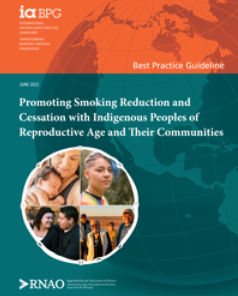
RNAO publishes new Best Practice Guideline (BPG) “Promoting Smoking Reduction and Cessation with Indigenous Peoples of Reproductive Age and Their Communities”
This BPG – aimed at meeting the needs of Indigenous women and peoples of reproductive age, their support networks and communities – can be used by nurses and members of the circle of care in primary care, community care and maternal/child settings, and in all domains of practice including administration, clinical, education, policy and research. It can also be used by organizations that employ nurses and members of the circle of care, including health and social service organizations, as well as academic settings.
This free of charge BPG provides evidence-based recommendations to help create and promote Indigenous-led smoking reduction and cessation services that are culturally safe. The recommendations include offering smoking cessation counselling, Indigenous health and cultural safety education for health providers, conducting advocacy for access to relevant resources and promoting smoke-free spaces.
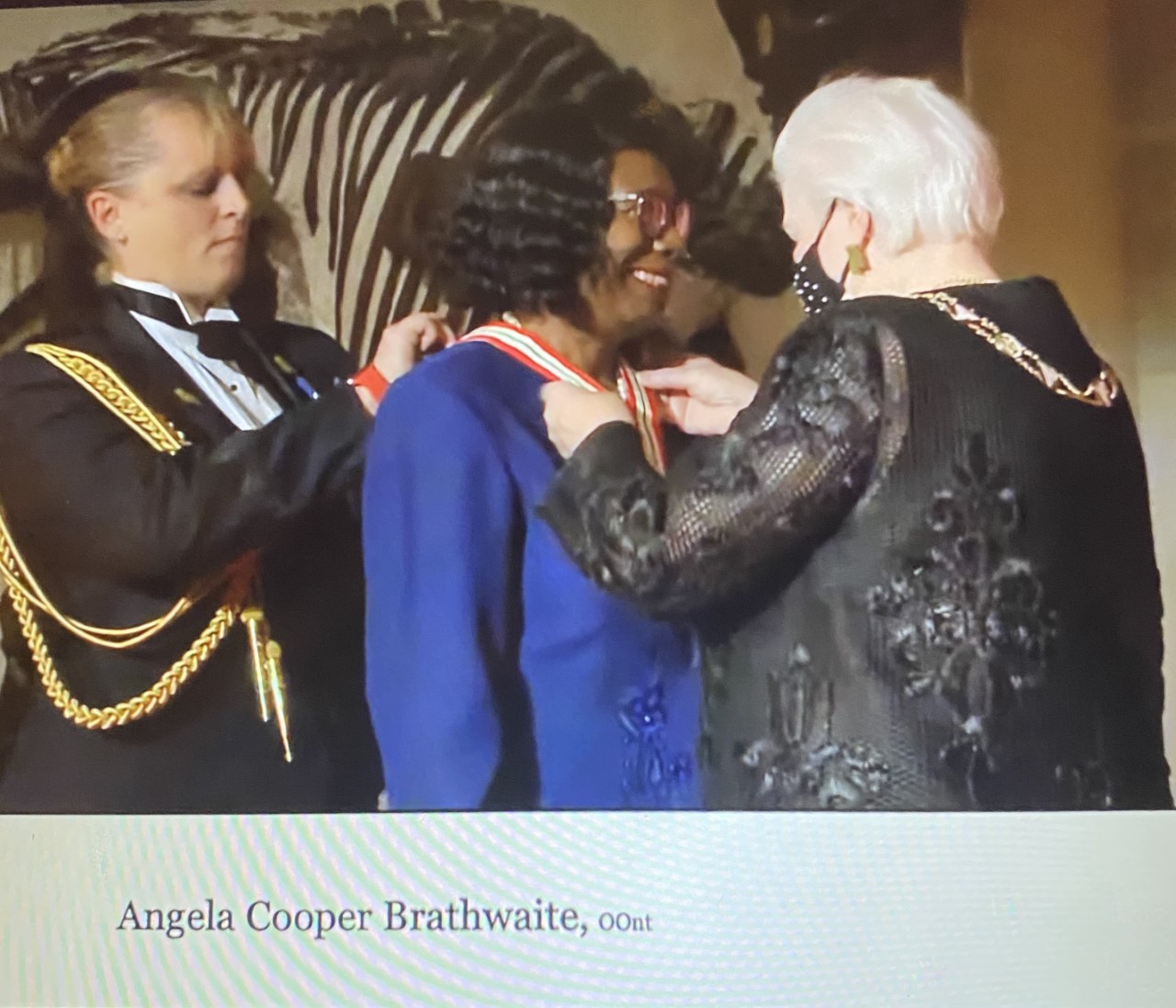
RNAO past president Dr. Angela Cooper Brathwaite named to the Order of Ontario
In November the Honourable Elizabeth Dowdeswell, the province’s lieutenant governor and chancellor of the Order of Ontario, announced 24 new appointments to the order, which is the province's highest civilian honour for individuals. Past RNAO president Dr. Angela Cooper Brathwaite was among those on the list. She has accomplished much in her nearly five decades as a registered nurse, providing care for patients, education for nurses and by leading change. Cooper Brathwaite is a visionary leader who has used her wisdom and vast experience to oversee numerous committees and task forces, providing key strategy and a path forward. She has national and international experience in public health, maternal-child, mental health and community health nursing, as well as academic and clinical teaching experience. She holds a PhD in nursing from the University of Toronto and a master’s degree in nursing from the University of Manitoba. She has worked diligently throughout her career to improve the lives of patients by launching initiatives to promote nursing education, improving women and children’s health and addressing racism in the nursing profession. Cooper Brathwaite was co-chair of RNAO’s Black Nurses Task Force, an RNAO board member and also RNAO president from 2018-2020. She has received RNAO leadership awards in political action and nursing administration, as well as RNAO's Award of Merit and Lifetime Achievement Award. In November, Cooper Brathwaite was also inducted as a Fellow of the American Academy of Nursing.
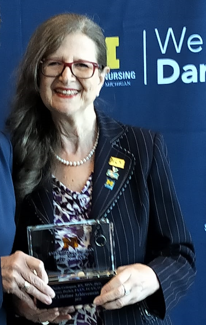
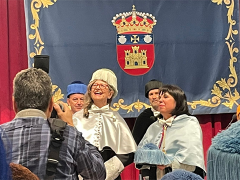
RNAO CEO, Dr. Doris Grinspun receives two prestigious international awards
On Oct. 13, Dr. Grinspun was invested with the Doctor Honouris Causa by the Universidad de Burgos in Spain. Grinspun accepted this honourary doctorate in person. She was awarded for her contributions to healthy public policy and evidence-based practice in Ontario and internationally. “Dr. Grinspun is relentless in her leadership, knowledge and courage to tackle the most difficult challenges in health care and nursing. As a result, recipients of health services and those who deliver nursing care are better off for her efforts,” says RNAO President Dr. Claudette Holloway. “I congratulate our esteemed CEO on this significant recognition and well-deserved honourary doctorate,” Holloway added. See details here.
On Sept. 23 in Ann Arbor, Michigan, RNAO CEO Dr. Doris Grinspun was honoured for being this year’s recipient of the University of Michigan School of Nursing’s (UMSN) Career Lifetime Achievement Award. UMSN’s Alumni Awards committee selected Grinspun for her commitment to advancing nursing, health, social policy and evidence-based practice. She is a proud alumna of UMSN’s Master of Science in Nursing program.
Nurses take action by seeking office
The June 2022 provincial election saw nine RNs (two incumbents) seeking election in various ridings across Ontario. This rise in political ambitions is long overdue, according to RNAO CEO Dr. Doris Grinspun. “We need to be in the legislature and in politics in general. That is what nursing needs and that is what the public needs,” Grinspun says (Ottawa Sun, May 12). Nurses have dealt with unsustainably high levels of stress and burnout due to the COVID-19 pandemic and the nursing shortage, leading many to want to be part of the change we all want to see. “As nurses, we are taught to be advocates for our patients and families. This feels like a very natural next step,” says Tyler Watt (above, second row right), who ran for the Liberal party in the Nepean riding (Ottawa Sun, May 12). Fiona Jager (above, top left) ran for the Green Party in Leeds-Grenville-Thousand Islands. “As a nurse, I’m deeply aware of the need for changes to the way we approach health care – both in the interest of patients and health-care workers,” she says (Global News, April 19). “That includes addressing the social determinants of health, like making housing more accessible and communities more caring and connected.” The two RNs who ran for re-election – Natalia Kusendova and Laurie Scott, both PC – won their seats in Mississauga Centre and Haliburton-Kawartha Lakes-Brock, respectively. The other five candidates (above, clockwise) were: Angela Kennedy (PC), Sarah Waljii (NDP), Marjan Kasirlou (Lib), and (not pictured) Aisha Jahangir (NDP) and Soo Wong (Lib). RNAO hosted a panel discussion during Nursing Week 2022, to allow the candidates to share their motivation for running with nursing colleagues. Watch for a more in-depth feature about their political ambitions in the Summer 2022 issue of RNJ.


